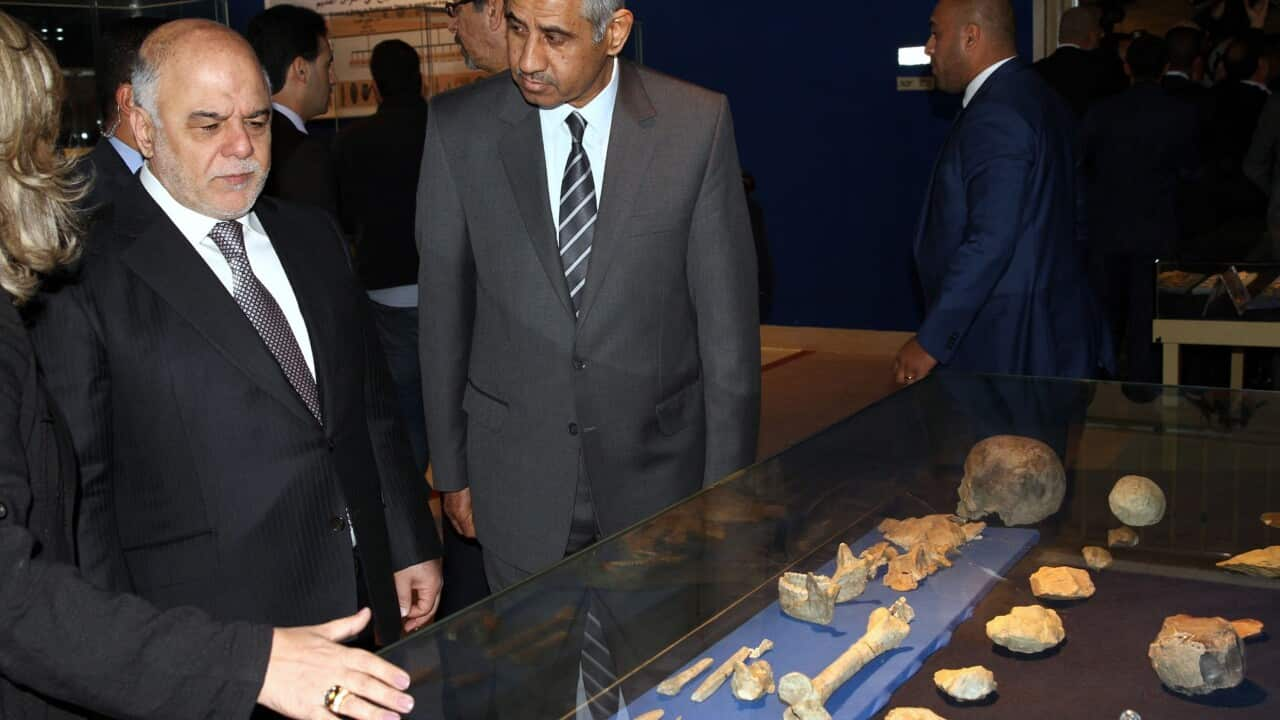Islamic State militants who destroyed priceless antiquities from the northern Iraqi city of Mosul have kept some artefacts to sell, Prime Minister Haider al-Abadi said on Saturday (February 28), vowing to prevent the radical Islamists from smuggling them to market.
Earlier on Saturday, Abadi cut the ribbon at the reopening ceremony for the National Museum of Iraq.
It is the first time the museum has been fully opened for visitors since the U.S.-led coalition invasion in 2003.
Responding to a video showing Islamic State fighters taking sledgehammers and power drills to sculptures and statues which date back nearly 3,000 years, Abadi also appealed for international support to thwart the "terrorist barbarians".
"We have information that Islamic State destroyed some (artefacts) and kept others for smuggling, and the smuggling operation is underway," he told a news conference.
All the items were marked and recorded, he said, and Iraq would seek to track them down with international help.
"We will chase them with the world on our side. This is a serious call to the Security Council and the United Nations and all peace-loving states to chase them all," he said.
The video, released on Thursday (February 26), showed men smashing up artefacts dating back to the 7th century BC Assyrian era, toppling statues from plinths, smashing them with a sledgehammer and breaking up a carving of a winged bull, with a drill.
Archaeologists said some of the items were from the ancient Mesopotamian cities of Nimrud and Nineveh, where Mosul now stands, as well as the ruins of Hatra, which dates back more than 2,000 years.
A commentary on the video said the statues were destroyed because they promoted idolatry.
Islamic State promotes a fiercely purist school of Sunni Islam, deeming many other Muslims to be heretics and destroying places of worship venerated for centuries by Shi'ites and Sufis, as well as attacking churches and other shrines in areas it controls.
The United Nations Security Council has condemned what it described as "barbaric terrorist acts" in Iraq by Islamic State, including the destruction of the artefacts, abduction of Sunni tribesmen and what it said was the immolation of 45 Iraqis.
The head of the United Nations culture and education agency UNESCO, Irina Bokova, said a cultural tragedy had struck Iraq.
The National Museum of Iraq briefly opened in July 2003 to display the treasure of Nimrud and in August 2014 it partially reopened to unveil two newly renovated halls.
Deadly bomb blasts in Baghdad
A series of attacks targeting public places and Shi'ite militia checkpoints in and north of Iraq's capital have killed 37 people.
The first bombs on Saturday exploded near the market in the town of Balad Ruz, 70 kilometres northeast of Baghdad, killing 11 people and wounding 50, police and hospital officials said.
Two suicide car bombers later attacked checkpoints manned by Shi'ite militiamen near the city of Samarra, killing 16 Shi'ite fighters and wounding 31, authorities said.
Samarra and surrounding areas have been under constant attacks by the Islamic State group, which holds about a third of Iraq and neighbouring Syria in its self-declared caliphate.
Clashes between Iraqi security forces and Islamic State militants followed the attack around Samarra, 95 kilometres north of Baghdad.
Saturday night, police said a bomb killed four people in western Baghdad, while another in Baghdad's neighbourhood of Abu Dashir killed three people and wounded eight.
Four mortar shells also hit homes in Sabaa al-Bour, just north of Baghdad, killing three people and wounding six, police said.
Iraq's Interior Ministry later said Iraqi border guards repelled an attack by Islamic State militants on a post on the Iraqi-Saudi border, saying several militants were killed.

